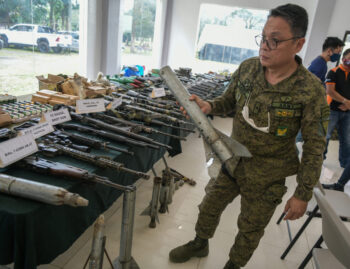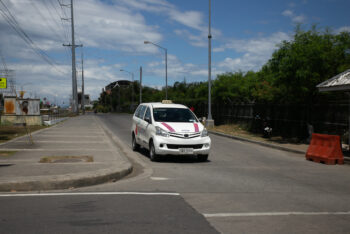
CEBU CITY (MindaNews / 6 September) – An unknown author once wrote: “I’m unsure which pain is worse– the shock of what happened or the ache for what never will.”
For those among us who have experienced the sudden death of a loved one, the pain is oftentimes excruciating. The suddenness of a tragic death is just so numbing that it takes a long while for us to recover and make a sense of the tragedy! In one minute, the beloved persons are there laughing in our company, and in the next moment, they are gone with the wind! The kind of sadness it brings runs very deep, indeed!
And – despite all the words of comfort that might be expressed and even with the passage of time – the ache remains as we think of all the moments that will no longer be shared with the loved ones! Everything else is then consigned to our memories! Meanwhile we grapple with the pain of separation. In the words of J.K. Rowling (author of the Harry Potter books): “You care so much you feel as though you will bleed to death with the pain of it.”
This is the kind of ache that I now bear in my heart at the sudden death of a very dear friend – Arnold Javellana-Vandenbroeck who was my godson at his wedding to his wife Norma. I have known Arnold for what seems like a lifetime and everyone who has met him through the years would attest to the fact that he was an extraordinary person. And that we were lucky he entered into our lives and enriched our personal narratives!
We have always been amazed if there are non-Filipinos – who find their way to our archipelago as missionaries, development workers and academicians – who fully embrace our culture to the point where we no longer think of them as foreigners. They learn our language and before long, they are so fluent in their adopted mother tongue that they could laugh at our silly jokes. They begin to appreciate our culture, sing our songs, eat our food even the baluts and durians that initially would repel the foreigners’ sense of sight and smell!
Arnold was that kind of person. It was as if when he arrived in Manila straight from Belgium that he instantly fell into the country’s charms and decided he would stay here for almost the rest of his life! It was the decade of the 1970s – as the country’s tumultuous contemporary history unfolded – when Arnold packed his bags, said goodbye to his family and came to this country. He would not have known by then that destiny would led to his finding the love of his life, to raise a family and to engage in development work as if this country was his own!
It was through the CICM missionaries that he reached the Philippines, not quite sure if we would ultimately embrace missionary life. That led him to study at the Asian Social Institute, whose Director – the late Fr. Francis Senden – was a member of the CICM. There he met Norma Javellana, a native of Malalag, Davao del Sur and an alumnus of Ateneo de Davao University, Batch 1967 (where she and Jeanette Birondo-Goddard were part of my college barkada).
Spending time together with both their academic (as they were both taking up Sociology) and other pursuits, they soon became an item. And it would not take a long while, before wedding bells would ring. Jeanette and I then became their godparents at their wedding (although I was an absentee at the ceremony as I could not leave my pastoral work then in Mati, Davao Oriental).
A string of work engagements brought Arnold and Norma everywhere from Butuan to the Netherlands, and then Antique and finally to Davao. In the meantime, they were blessed with a daughter (Maya) and a son (Bayani). At the height of the martial law regime, they relocated to Butuan City and founded a research-publications NGO, the FarmDev. It consisted of a few staff and they were engaged in doing research on urgent issues impacting on the lives of the poor in Agusan and coming up with micro-media publications. Some of these research projects included a study of the impact of logging, agri-business plantations (banana, palm oil) as well as the never-ending human rights violations.
Such research/publication engagements were not without risks during this oppressive regime where development workers could easily be red-tagged, and consequently be arrested or even salvaged. The Vandenbroecks survived the crisis, unscathed. But the risks became so intense that they thought it would be safer to leave Butuan. A job offer with a European funding agency brought them to the Netherlands which led to Arnold’s work of monitoring development projects all over Asia, which occasionally led to regular visits to the Philippines.
Eventually, they missed the Philippines and when a possibility of returning arose, they grabbed it. This was made possible through a joint international aid project with the Provincial Government of Antique. Arnold was offered a job as a Supervising Director overseeing the implementation of an area development project for the whole province. The whole family lived in Antique for a few years, with Norma getting engaged in the locality’s vibrant cultural work.
Eventually, Davao beckoned when both thought that Davao City would be the ideal place for raising their family as Maya and Bayani were growing older. They built a house in Ma-a and decided that they would rather not work in the academe or the corporate world. Instead they would continue to work as freelancers. For a while, they collaborated with local groups engaged in micro-development projects in the Mintal-Calinan area. These were their engagements after the EDSA People Power of 1986.
Eventually with some of their friends (including the late Fely Soledad – also ADDU batch ’67, Yolando Arban and myself) we formed the initial core group of the Interfacing Development Initiatives, Inc. (IDIS), setting it up as a registered NGO. At first we were planning to support area development initiatives. However, as there arose a greater concern for what was happening to the environment, it was not long before IDIS shifted its focus to ecological advocacy. This was in the early 1980s when there were just a few agencies and persons knowledgeable about and engaged in responding to global warming and eventually the impact of climate change.
IDIS’ first major ecological concern was the impact of the expanding banana plantations on the environment because of the toxic fertilizers and chemicals used indiscriminately. One major focus was the use of small planes to fly over a vast area even beyond the scope of the plantations to bombard the bananas with chemicals. Affected were poor communities situated at the peripheries of the plantations, leading to health issues especially among the elderly and children. IDIS went into a research on how the plantations destroyed the environment and affected the surrounding communities, conducted campaigns, pressured the local government to pass laws to stop the aerial spraying and to make the banana companies liable for the illness suffered by those affected by the toxic chemicals.
Arnold and Norma were at the head of this major campaign that led to the filing of a case against the banana plantations at the RTC (Regional Trial Court). The first round led to the judge’s decision to end aerial spraying; however the corporate firms moved to the RTC in Cagayan de Oro, which nullified the Davao decision. The case then moved to the Supreme Court, which sided with the corporate firms.
But despite these setbacks, the Vandenbroecks sustained their ecological engagements which have included: lobbying the city government for setting up a park in the Shrine Hills and having bicycle lanes, stopping the cutting of heritage trees in the city, protecting the watersheds of the city threatened by continuous logging, safeguarding the water source to make sure potable water is made available to all, protesting against an unsound zero waste management program of the city through the use of an incinerator as well as the building of a bridge from the mainland to Samal Island that would destroy the remaining coral reefs.
Because of these engagements, they are seen regularly at the Legislative Building of the city when the City Council deliberates on projects that impact the environment. The DENR staff have to contend with their regular visits as they made sure to ventilate their concerns. For this reason, they have been invited at some of the proceedings of these government agencies when they open these gatherings for public discussion.
For her unrelenting efforts to advance the ecological concerns of her beloved city, Norma was awarded the Datu Bago Award a few years ago. If the recognition was to be given to a couple, the Javellana-Vandenbroecks should have been the recipient. Perhaps Arnold could now be recommended to receive the award posthumously. We have always known that in Arnold’s presence, we were in the company of an extraordinary human being and that he was an important part of our lives. Unfortunately, in the words of the great pacifist Mahatma Gandhi – “You don’t know who is important to you until you actually lose them.”
Many of us who have known Arnold for the longest time have always been so amazed at the range of his talents (he sings like John Denver as he strums he guitar), his sharp mind, his fluency at a number of languages, his deep concern for human rights and the integrity of creation, his intense passion for life as shown in how he relates to the world around him and his love for his family and friends. He will surely be missed by a wide circle of family, friends and acquaintances.
Compared to some of us who have been faced with health issues, Arnold was one of those who you think will always be perpetually strong and healthy. He and Norma lived a most healthy lifestyle; he went biking every morning. They’ve never been seriously sick. So we always assumed that he would still be around for a long, long time. Through the thousand moments shared in our lives punctuated with a whole range of human emotions, we’ve always assumed we would depart from this planet much earlier than him. At his passing – ironically after meeting an accident while he was out biking – we can echo the words of the writer Morgan Matson: “A thousand moments I had just taken for granted, mostly because I assumed there would be a thousand more.”
We are poorer at the departure of Arnold from our company. We share the grief of his beloved widow Norma, his children Maya and Arnold, daughter-in-law Ina and grandchildren Nino and Guia. The sudden and shocking death could certainly bring a grief so overwhelming that the words of comfort from relatives and friends may not be enough to assuage the pain of losing a loved one. For in such sad circumstances, the only consolation we can offer everyone who share this collective grief is to hold on to our belief that Arnold now rests in the bosom of the Creator. And as we pray for Arnold’s eternal rest and comfort to his extended family in Belgium and in Davao, we also pray that we, too, can live as meaningful a life as was lived by this extraordinary human being!
Meanwhile we just have to face this deep grief we all share. And Elizabeth Kubler-Ross, the Swiss-American psychiatrist, has wise words to those of us feeling forlorn at the sudden death of Arnold: “The reality is that you will grieve forever. You will not “get over” the loss of a loved one; you will learn to live with it. You will heal and rebuild yourself around the loss you have suffered. You will be whole again, but you will never be the same. Nor should you be the same, nor would you want to.”
(MindaViews is the opinion section of MindaNews. Redemptorist Brother Karl Gaspar is Mindanao’s most prolific book author. Gaspar is also a Datu Bago 2018 awardee, the highest honor the Davao City government bestows on its constituents. He recently moved to his new assignment in Cebu City.)







